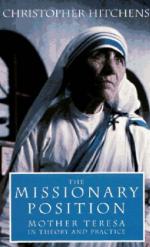
|
| Name: _________________________ | Period: ___________________ |
This test consists of 5 multiple choice questions, 5 short answer questions, and 10 short essay questions.
Multiple Choice Questions
1. What is the name of the documentary about Mother Teresa's shortcomings?
(a) When Borders Bleed.
(b) Blaming the Victims.
(c) Hell's Angel.
(d) Something Beautiful for God.
2. According to the Introduction, Haiti is renowned as the place where the _________ receive the _________ treatment.
(a) Tourists, best.
(b) Wretched, cruelest.
(c) Wealthy, most luxurious.
(d) Religious, most insulting.
3. While in Calcutta, what did the author witness the poor doing to Mother Teresa that he disliked?
(a) Grabbing her hem.
(b) Kissing her feet.
(c) Praising her.
(d) Condemning her.
4. What quote from Lenin is used in the Introduction?
(a) "Democracy is indispensable to socialism."
(b) "Money has no smell."
(c) "Crime is a product of social excess."
(d) "A lie told often enough becomes the truth."
5. In how many countries, "without counting India," did Mother Teresa operate convents?
(a) Over 105.
(b) More than 200.
(c) Over 250.
(d) 47.
Short Answer Questions
1. What impression, according to the author, was essential to Muggeridge's project?
2. In which two magazines did the author publish early polemics against Mother Teresa?
3. What did the fifteen year old boy dying of a kidney complaint in the Home for the Dying need to save him?
4. According to the 1994 Lancet article, diagnostic investigations were seldom permissible because Mother Teresa preferred ________ to planning.
5. Ms. Victoria Gillick was a ________ that accused the author's documentary of being a "Jewish/Muslim conspiracy against the One True Faith."
Short Essay Questions
1. What result does the author point out, will come of China's family restrictions?
2. What was Mother Teresa's relationship with Charles Keating?
3. What were the results of the Christian "civilizing mission" as described in "Ubiquity," Chapter 1?
4. What persuaded Mother Teresa to become a nun at 18 years old?
5. Describe the Church's policies on procreation in light of an overpopulated world.
6. What does the author state in "Good Works & Heroic Virtues," Chapter 3, that Mother Teresa's acceptance of numerous awards, and her affectations of poverty prove?
7. What, according to the Introduction, were the author's difficulties in researching Mother Teresa's life?
8. What does the author mean by this quote from the Introduction, "If the baffled and fearful prehistory of our species ever comes to an end, and if we ever get off of our knees and cull those blooms, there will be no need for smoking altars and forbidding temples with which to honour the freethinking humanists, who scorned to use the fear of death to coerce and flatter the poor."
9. What changes did Albania experience in "Ubiquity," Chapter 1?
10. Why does Mother Teresa think that parents of drug users do not care for their children?
|
This section contains 965 words (approx. 4 pages at 300 words per page) |

|




